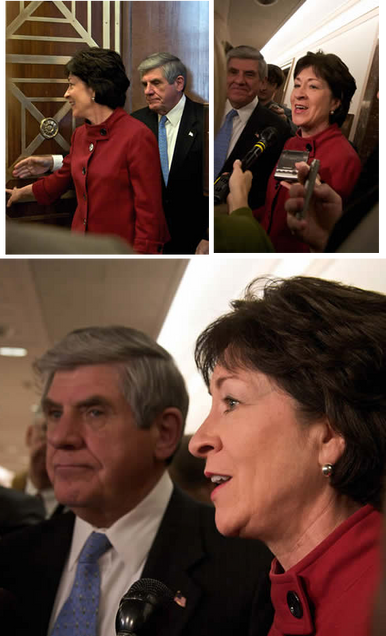Collins Leads Move to Trim Stimulus Package
COLLINS
Bangor Daily News
Drew FitzGerald
Boston University Washington News Service
Feb. 5, 2009
WASHINGTON – A bipartisan group of senators led by Susan Collins, R-Maine, and Ben Nelson, D-Neb., met three times Thursday to “scrub” a now $900 billion economic stimulus bill of measures that they said would not directly create jobs.
The meetings came a day after Collins and Sen. Olympia Snowe, R-Maine, each met with President Barack Obama to discuss their concerns about the size and makeup of the bill.
In the Capitol Hill meetings Thursday, closed at times even to top aides, Collins and 14 other senators pored over the legislation line by line, removing any provisions that they thought would not save or create jobs or jumpstart spending.
“I know it’s unusual to think of senators doing that kind of painstaking, thorough work, but that’s exactly what we’re doing,” Collins said.
“It’s always refreshing to be able to do that because there are no filters and you talk straight, directly to one another,” added Nelson, a fiscally conservative Democrat who also met with the president Wednesday.
Details on the proposed reductions were not available Thursday night, and the talks could continue into Friday, but the group has come up with at least $50 billion in cuts, according to a press spokesman for Nelson.
Caught in the hall during a break in the negotiations, Collins said that the bi-partisan group has done “an in-depth scrub of the bill” to cut spending. Collins also said she originally wanted roughly a $650 billion package, but changed her mind after her meeting with Obama Wednesday.
“The president did convince me that a larger package would be good, but I can’t support a package the size of what the House passed,” she said.
“We don’t want a package that is too small, because that will end up just wasting the money,” Collins said. “On the other hand, we’re very leery of having an enormous package that would not be necessary and would just boost the federal deficit.”
As the meetings ran late into the afternoon, Collins said senators from both parties were disagreeing on several spending items. Part of the difficulty arose from different senators’ definitions of what is a stimulus, she said, because even economists differ on the ideal size of the package.
Snowe, who spent most of the week working to amend the tax portion of the bill, also said the spending half of the package needed revision. She said the dollar cost of the bill was not as important as its composition, though she said $900 billion was too much.
“I’m more concerned… that every measure is specifically geared toward job creation and stimulating the economy,” Snowe said in an interview. “When you’re going to spend to the tune of $800 billion, you’d better get it right.”
Snowe said it is important that more of the spending outlined by the Senate Appropriations Committee last week stimulate the economy relatively soon.
Both senators said they consider any measure not directly intended to create jobs inappropriate for the stimulus bill.
Snowe said she also planned to submit a temporary 35 percent tax break for small businesses to prevent them from laying off more workers. The problem is made even harder because banks are unwilling to lend to businesses trying to stay afloat, she said.
“We’re seeing so many businesses on Main Street shuttering,” she said. “It’s an emergency, in that sense.”
Snowe also sponsored an amendment Wednesday to strengthen oversight of the Treasury Department when it decides to dole out the second phase of its $700 billion federal bailout program. Companies supported by the bailout would have to repay any cash bonuses they gave executives while receiving the federal funding. The Senate passed the measure by unanimous consent.
“The flawed framework of the first financial rescue package enacted by Congress left open the escape hatch of golden parachutes for top executives on Wall Street – the same individuals whose careless mistakes hurt the financial system and forced taxpayers to foot the bill in the first place,” Snowe said in a statement Wednesday.
The stimulus package passed the House last week without a single Republican vote and President Obama has said he would like to have a bi-partisan measure on his desk by the end of next week.
-30-


